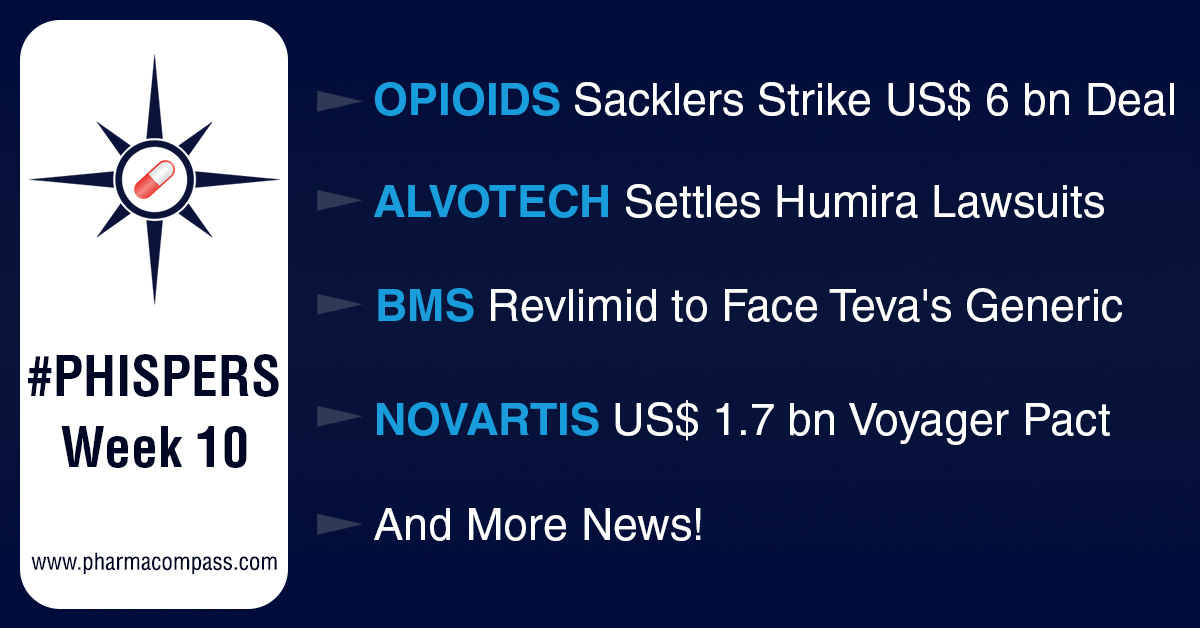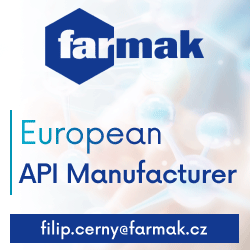
By PharmaCompass
2022-03-10
Impressions: 1,822 Article
This week’s Phispers brings you news about lawsuit settlements, trials, recalls and new deals. In the opioid crisis case, the Sackler family struck a US$ 6 billion deal with US states to settle lawsuits that claim Purdue Pharma’s painkiller OxyContin helped fuel the crisis.
After battling it out in court over its Humira biosimilar, Alvotech finally reached a settlement this week with AbbVie. As per the settlement, Alvotech can now launch its Humira biosimilar on July 1, 2023, provided it receives an FDA approval.
In other news, Bristol Myers Squibb’s blockbuster cancer drug Revlimid will be facing competition for the first time in the US from Teva’s generic. Roche announced a four-year phase 3 study of its Alzheimer’s drug gantenerumab to test if the drug can prevent memory loss in patients who either don’t have or are in the earliest stages of the disease.
Gilead said its FDA-approved oncology drug Trodelvy has succeeded in a late-stage clinical trial for HR+/HER2- breast cancer. However, its decision to withhold data for now has raised doubts in the minds of investors.
Sanofi moved the FDA claiming that the labels of its rival Seqirus’ flu vaccines are misleading. In a setback to Alpine Immune Sciences, the FDA placed a partial clinical hold on a phase 1 trial of its immunotherapy drug davoceticept following the death of a patient.
Novartis inked a US$ 1.7 billion licensing deal with Voyager Therapeutics for the discovery of capsids for central nervous system disorder gene therapies. And Moderna said it is going to set up a US$ 500 million manufacturing facility in Kenya to produce messenger RNA vaccines.
In recall news, the Canadian unit of Pfizer recalled two blood pressure drugs after the country’s health authority found high levels of a type of nitrosamine in the drugs. Meanwhile, FDA issued a guidance to help drugmakers recall products quickly and take necessary steps before a product reaches the recall stage.
Sackler family strikes US$ 6 billion deal with states to settle Purdue opioid lawsuits
Days after Johnson & Johnson and three US drug distributors agreed to finalize a US$ 26 billion settlement to resolve opioid lawsuits, the Sackler family that owns Purdue Pharma followed suit. Sacklers have struck a deal to pay up to US$ 6 billion to resolve allegations that claim Purdue Pharma’s opioid painkiller OxyContin helped fuel the US opioid crisis.
The eight US states and the District of Columbia, which had blocked a previous US$ 4.3 billion settlement, reached the deal after multiple rounds of negotiations with the Sackler family. The new settlement is 40 percent bigger than the previous one inked last year.
Members of the Sackler family also issued an apology saying they sincerely regret that OxyContin “unexpectedly” became part of the opioid crisis that caused around 500,000 overdose deaths in the US. The deal has to be approved by US Bankruptcy Judge Robert Drain for it to come into effect, and will give the Sacklers immunity from future opioid lawsuits. It will also put the company on track to resolve its bankruptcy case.
Alvotech, AbbVie put lawsuits to bed; Alvotech may launch Humira biosim next year
After battling it out in courts over its Humira biosimilar, Alvotech has reached a settlement with pharma giant AbbVie. Under the deal, AbbVie will grant the Icelandic pharma a license to patents of its blockbuster rheumatoid arthritis drug Humira in the US. Alvotech can now launch its Humira biosimilar on July 1, 2023, provided it receives an approval from the US Food and Drug Administration (FDA).
The settlement also resolves all legal disputes between AbbVie and Alvotech in the US related to the biosimilar. Alvotech’s Humira biosim is already approved in Europe, Canada and the UK. In the US, the drug is yet to be approved by the FDA.
Last year, AbbVie had lodged a trade secrets lawsuit, accusing Alvotech of recruiting one of its former employees who had “stolen” sensitive information about Humira’s production. After a federal judge in Illinois dismissed the case, AbbVie filed a complaint with the US International Trade Commission in December to prevent Alvotech from selling the biosim in the US.
BMS’ blockbuster Revlimid finally faces competition in US from Teva’s generic
Bristol Myers Squibb’s mega blockbuster cancer drug Revlimid will finally have competition from a generic in the US. This week, Israeli drugmaker Teva announced the launch of its generic version of Revlimid (lenalidomide) capsules for the treatment of multiple myeloma (a cancer of the white blood cells) in combination with dexamethasone. Teva is yet to reveal the pricing of the drug.
Five other generic drugmakers — Natco Pharma, Dr. Reddy’s Laboratories, Cipla, Sun Pharma and Alvogen — have licensing deals with BMS to launch small amounts of their generics starting this month. However, they can’t launch an unlimited number of their meds until January 31, 2026.
BMS acquired Revlimid in 2019 as part of its US$ 74 billion Celgene buyout. The drug generated sales of US$ 12.8 billion in 2021. The American drugmaker expects Revlimid sales to drop by US$ 2 billion to US$ 2.5 billion every year. The drugmaker is planning a slew of deals and M&As over the next two years to offset the revenue loss from Revlimid.
FDA nod for expanded use of cancer drug Opdivo: The FDA on Friday approved the expanded use of BMS’ cancer drug Opdivo along with chemotherapy to treat patients with an aggressive form of lung cancer. First approved in 2014, the drug is used to treat patients with several types of cancer including bladder, lung, blood, head and neck and advanced melanoma. It brought in around US$ 2 billion in sales in the last quarter.
Novartis inks potential US$ 1.7 billion deal with Voyager for gene therapies
Novartis has inked a potential US$ 1.7 billion licensing deal with Massachusetts-based biotech Voyager Therapeutics for the discovery of capsids for central nervous system disorder gene therapies.
As part of the deal, Novartis will have access to Voyager’s proprietary RNA-driven Tracer capsid discovery program that discovers new adeno-associated virus capsids capable of delivering gene therapies into the brain. The Swiss biotech will pay Voyager US$ 54 million upfront and up to US$ 1.7 billion in various milestones and royalties. It can license three central nervous system targets within 12 months of signing the deal and has the option to opt for two more additional targets later.
Moderna to set up mRNA vaccine plant in Kenya: Moderna is setting up a state-of-the-art manufacturing facility in Kenya at the cost of US$ 500 million to produce messenger RNA vaccines, including Covid-19 shots. The plant, Moderna's first in Africa, should be operational by 2023. It plans to manufacture and supply around 500 million doses of mRNA vaccines to the continent each year.
Roche plans four-year trial to test if its Alzheimer's candidate prevents memory loss
Roche on Thursday announced a four-year phase 3 study of its Alzheimer’s drug gantenerumab to test whether the amyloid-clearing antibody can prevent memory loss in patients who either don’t have the disease but are at risk or are in the earliest stages of the disease.
Christened Skyline, the study will begin on June 24 and enroll 1,200 patients across 17 countries. Patients will be given the choice of dosing either every week or every two weeks.
Meanwhile, the Genentech unit of Roche is carrying out two pivotal trials of gantenerumab to test whether the drug can slow cognitive decline in patients who are already beginning to suffer memory loss. The reports are slated to be released later this year.
The drug received a breakthrough therapy designation from the FDA in October last year. Eli Lilly’s drug donanemab had been granted the same designation in July 2021.
Sanofi moves FDA, pressing for label change of rival Seqirus’ flu vaccines
French drugmaker Sanofi is taking on its influenza vaccine rival Seqirus and has moved the FDA with a complaint that the labels of two of the CSL group company’s flu vaccines are misleading. Sanofi has argued that the labels should be amended to reflect the mixed results Seqirus obtained in the post-approval trials of the two shots.
The complaint, filed in a citizen petition published earlier this month, pertains to Seqirus’ Fluad – an adjuvanted, trivalent flu shot that snagged accelerated approval in November 2015 – and Fluad Quadrivalent, a quadrivalent formulation of the same vaccine that received an accelerated approval in February 2020.
Sanofi alleges that Seqirus used the quadrivalent formulation in its Fluad confirmatory trial, rather than the trivalent formulation that snagged approval. Even then, the quadrivalent formulation missed the mark in the efficacy trial, Sanofi said.
Seqirus has to complete its confirmatory trial requirement by March 2024. While Sanofi’s flu business generated sales of over US$ 2.8 billion in 2021, Seqirus generated US$ 1 billion in seasonal flu vaccine sales last year.
Pfizer Canada recalls two BP drugs over potential cancer-causing impurity
Last year, Pfizer’s blockbuster smoking cessation drug – Chantix – was found to contain high levels of nitrosamine impurities and the drug behemoth had to recall batches of the drug.
Last week, nitrosamine impurities were back to haunt the drugmaker. The Canadian unit of Pfizer recalled two blood pressure drugs after the country’s health authority found high levels of a type of nitrosamine in the drugs.
Pfizer Canada recalled eight lots of blood pressure drug Accuretic after higher-than-approved levels of the potential cancer-causing impurity – N-nitroso-quinapril – were found. The Accuretic recall came just days after the drugmaker pulled 15 lots of another blood pressure drug, Inderal-LA, from Canadian shelves over similar concerns.
Fresenius Kabi recalls IV injections: Fresenius Kabi USA has issued a voluntarily recall of seven lots of sodium acetate injection to the user level after particulate matters were found in reserve and/or stability sample vials. The injection is used as a source of sodium in addition to large volume IV fluids to prevent or correct low blood sodium levels.
FDA guidance to help drugmakers become recall ready: The FDA has finalized a guidance to help drugmakers recall products quickly and take necessary steps before a product reaches the recall stage. The guidance describes the steps that companies should take to develop recall policies and procedures, including training, planning and record-keeping, to reduce the time a recalled product is in the market. It also explains how to keep records and product coding.
Gilead’s Trodelvy shows benefit in late-stage trial for HR+/HER2- breast cancer
In 2020, Gilead made its largest-ever acquisition by picking up Immunomedics for US$ 21 billion, hoping to turn its breast cancer drug Trodelvy into a mega blockbuster.
On Monday, Gilead said Trodelvy met its primary endpoint of progression-free survival in a phase 3 study that tested the drug in late-line metastatic HR+/HER2- breast cancer patients who had received prior treatment. The study demonstrated a significant improvement in progression-free survival versus physician’s choice of chemotherapy, Gilead said. A primary analysis suggested the drug helped patients live longer, and no new safety concerns were reported.
Trodelvy has been approved in the US to treat “triple negative” breast cancer. The drug has also won an accelerated approval for advanced urothelial cancer.
While Gilead said it would present more details about the study at an upcoming medical meet, investors are not convinced about the drug’s effectiveness. Its descriptions are raising “considerable uncertainty about” whether the results are clinically meaningful for patients or not, said RBC Capital Markets analyst Brian Abrahams.
To lay off 114 Immunomedics staffers: Gilead has decided to lay off 114 staffers based out of Immunomedics’ headquarters in Morris Plains, New Jersey. According to a filing with the New Jersey Department of Labor, Gilead has disclosed that the layoffs will take place in three phases — in April, September and December. A Gilead spokesperson said the company plans “to relocate the New Jersey site to a new, larger space in the surrounding Morris Plains area.”
FDA places partial hold on Alpine’s phase 1 cancer drug trial after patient death
Last week, the FDA had put a clinical hold on Ceylad Oncology’s CAR-T cell therapy — CYAD-101 — which was being tested in combination with Merck’s cancer drug Keytruda following the death of two patients during a phase 1b trial.
And this week, the FDA placed a partial clinical hold on Alpine Immune Sciences’ phase 1 trial of its immunotherapy drug davoceticept being tested in combination with Keytruda following the death of a patient.
The Seattle-based immunotherapy company said the participant had choroidal melanoma (a common intraocular tumor) and had received a single dose each of davoceticept and Keytruda. Patients currently enrolled in the study, which began in June 2021, can continue to receive treatment, but Alpine cannot enroll new patients.
The PharmaCompass Newsletter – Sign Up, Stay Ahead
Feedback, help us to improve. Click here
Image Credit : Phisper Infographic by SCORR MARKETING & PharmaCompass is licensed under CC BY 2.0
“ The article is based on the information available in public and which the author believes to be true. The author is not disseminating any information, which the author believes or knows, is confidential or in conflict with the privacy of any person. The views expressed or information supplied through this article is mere opinion and observation of the author. The author does not intend to defame, insult or, cause loss or damage to anyone, in any manner, through this article.”







